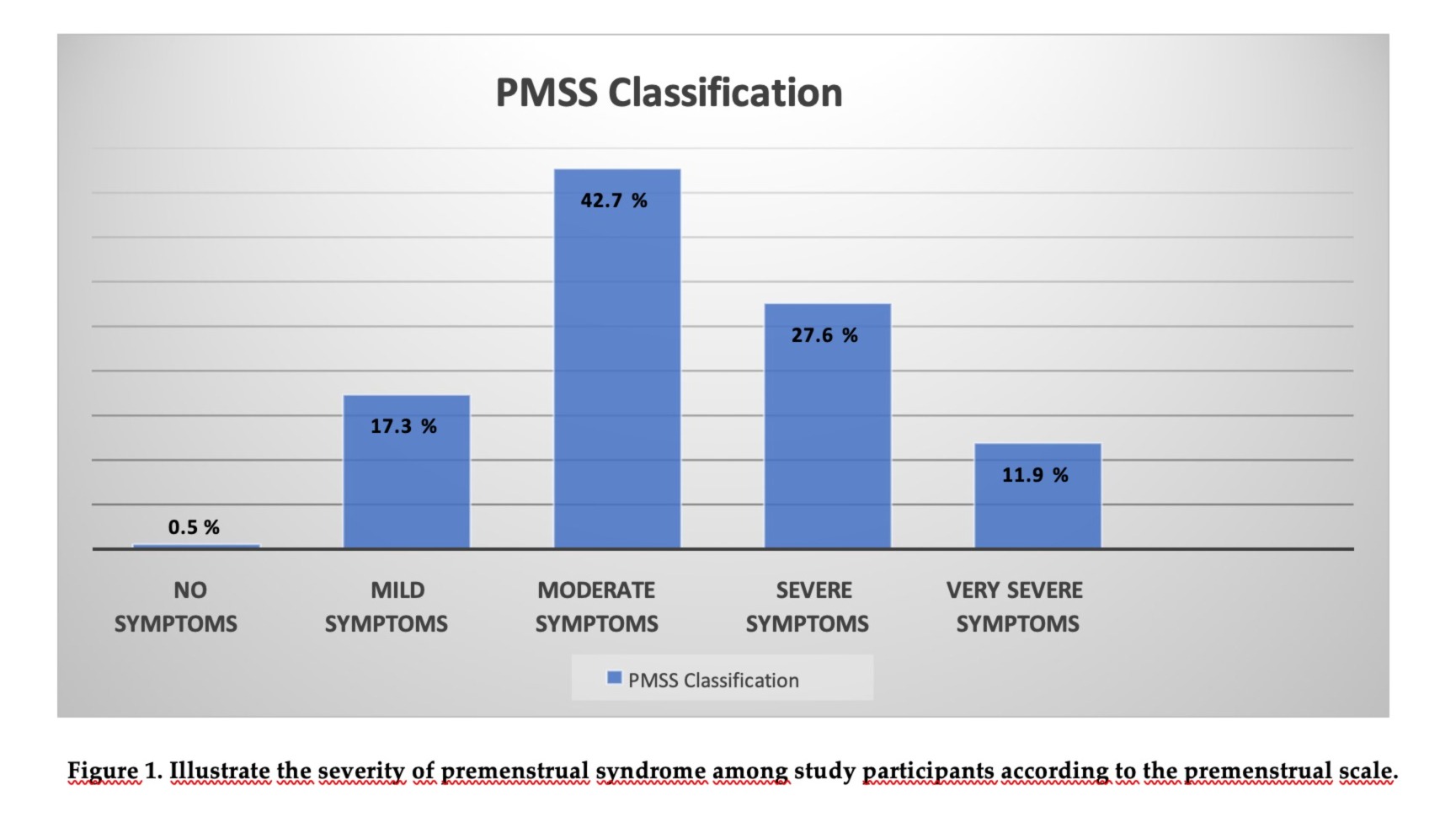A cross Sectional Study on Factors Associated with Premenstrual Syndrome among Female Students in Medical Colleges of Mosul University
DOI:
https://doi.org/10.23917/bik.v18i1.7055Keywords:
female students, lifestyle modification, medical school, premenstrual syndromeAbstract
Premenstrual syndrome is a prevalent health issue, especially among female medical school students, affecting their academic and professional performance. The study aimed to assess the extent of PMS experienced by female medical school students and identify factors that can be associated with the severity of PMS symptoms. A descriptive, cross-sectional design utilizing a quantitative approach was adopted from October 8th, 2022, to March 30th, 2023. Simple random sampling was used to select a sample of 185 students from Mosul University Medical Colleges, with 51 students from the Nursing College, 44 from the Medicine College, 47 from the Pharmacy College, and 43 from the Dentistry College. Data were collected using a structured questionnaire and Premenstrual Syndrome Scale. The sample consisted of female students whose mean age was 22.6 ± 4 years and whose body mass index was 22.8 ± 4.4. Of the total sample, 97 participants (52.4%) reported not participating in physical activity. Furthermore, 79 students (42.7%) exhibited moderate symptoms of premenstrual syndrome (PMS), while 27.6% reported severe symptoms of PMS, assessed using the premenstrual scale. In conclusion, the study found a significant statistical difference between cycle duration, duration of menses, regularity of period, amount of bleeding, duration of premenstrual symptoms, and familial history of PMS concerning the severity of PMS symptoms; further studies could explore the potential role of dietary and lifestyle modifications in the management of PMS symptoms and develop effective interventions to address its impact on female students.
Downloads
References
Alwafa, R., Badrasawi, M., & Haj Hamad, R. (2021). Prevalence of premenstrual syndrome and its association with psychosocial and lifestyle variables: A cross-sectional study from Palestine. BMC Women’s Health, 21(1), 1–12. https://doi.org/10.1186/s12905-021-01374-6.
Ahmed, S., & Saeed, A. (2019). Knowledge and self-care practices of adolescents with premenstrual syndrome in Erbil City. Erbil Journal of Nursing and Midwifery, 2(1), 9–18.
AlQuaiz, A., Albugami, M., Kazi, A., Alshobaili, F., Habib, F., & Gold, E. B. (2022). Dietary, psychological and lifestyle factors associated with premenstrual symptoms. International Journal of Women’s Health, 14, 1709–1722.
Al-Shahrani, A. M., Miskeen, E., Shroff, F., Elnour, S., Algahtani, R., Youssry, I., & Ahmed, S. (2021). Premenstrual syndrome and its impact on the quality of life of female medical students at Bisha University, Saudi Arabia. Journal of Multidisciplinary Healthcare, 14, 2373–2379.
Chumpalova, P., Iakimova, R., Stoimenova-Popova, M., Aptalidis, D., Pandova, M., Stoyanova, M., & Fountoulakis, K. N. (2020). Prevalence and clinical picture of premenstrual syndrome in females from Bulgaria. Annals of General Psychiatry, 19(1), 1–7.
Christy, C., Zeina, A., Safaa, D., & Shafika, A. (2018). Factors associated with premenstrual syndrome and its different symptom domains among university students in Lebanon. International Journal of Women’s Health and Wellness, 4(1), 1–10. https://doi.org/10.23937/2474-1353/1510068
Dawood, K. S. (2020). Assessment of premenstrual syndrome (PMS) symptoms among female students in Baghdad City. Indian Journal of Public Health Research & Development, 11(4).
Dutta, A., & Sharma, A. (2021). Prevalence of premenstrual syndrome and premenstrual dysphoric disorder in India: A systematic review and meta-analysis. Health Promotion Perspectives, 11(2), 161.
Gnanasambanthan, S., & Datta, S. (2019). Premenstrual syndrome. Obstetrics, Gynaecology & Reproductive Medicine, 29(10), 281–285.
Hashim, M. S., Obaideen, A. A., Jahrami, H. A., Radwan, H., Hamad, H. J., Owais, A. A., Alardah, L. G., Qiblawi, S., Al-Yateem, N., & Faris, “Mo’ez Al-Islam” E. (2019). Premenstrual syndrome is associated with dietary and lifestyle behaviors among university students: A cross-sectional study from Sharjah, UAE. Nutrients, 11(8), 1939. https://doi.org/10.3390/nu11081939.
Komada, Y., Ikeda, Y., Sato, M., Kami, A., Masuda, C., & Shibata, S. (2019). Social jetlag and menstrual symptoms among female university students.
Maity, S., Wray, J., Coffin, T., Nath, R., Nauhria, S., Sah, R., Waechter, R., Ramdass, P., & Nauhria, S. (2022). Academic and social impact of menstrual disturbances in female medical students: A systematic review and meta-analysis. Frontiers in Medicine, 9, 165. https://doi.org/10.3389/fmed.2022.821908
Matsumoto, T., Egawa, M., Kimura, T., & Hayashi, T. (2019). A potential relation between premenstrual symptoms and subjective perception of health and stress among college students: A cross-sectional study. BioPsychoSocial Medicine, 13(1), 1–9. https://doi.org/10.1186/s13030-019-0167-y.
Pearce, E., Jolly, K., Jones, L. L., Matthewman, G., Zanganeh, M., & Daley, A. (2020). Exercise for premenstrual syndrome: A systematic review and meta-analysis of randomised controlled trials. BJGP Open, 4(3).
Padmavathi, M. P., Sankar, R., Kokilavani, N., Dhanapal, K., & Ashok, B. (2015). Validity and reliability study of the Premenstrual Syndrome Scale (PMSS). International Journal of Advances in Nursing Management, 2(1), 1–3.
Shiferaw, M. T., Wubshet, M., & Tegabu, D. (2014). Menstrual problems and associated factors among students of Bahir Dar University, Amhara National Regional State, Ethiopia: A cross-sectional survey. The Pan African Medical Journal, 17, 246. https://doi.org/10.11604/pamj.2014.17.246.2230.
Yamamoto, K., Okazaki, A., Sakamoto, Y., & Funatsu, M. (2009). The relationship between premenstrual symptoms, menstrual pain, irregular menstrual cycles, and psychosocial stress among Japanese college students.

Submitted
Accepted
Published
How to Cite
Issue
Section
License
Copyright (c) 2025 Abdulrahman Mazin, Younes Attia, Atheer Abd Ahmed, Karam Yaseen Fathi

This work is licensed under a Creative Commons Attribution 4.0 International License.


















